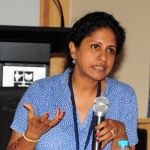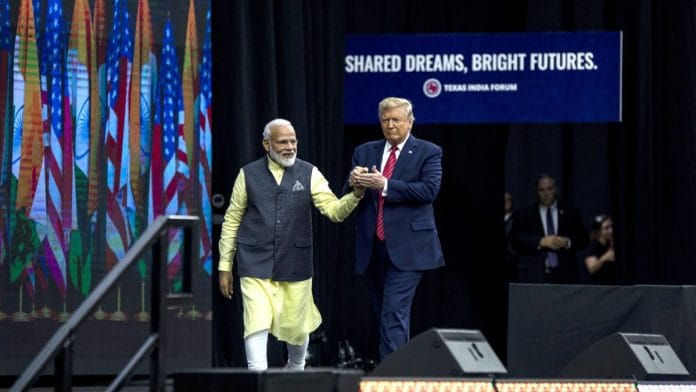Sanjaya Baru | Policy analyst and former media advisor to prime minister of India
The Indian Express
Baru explains that US President Donald Trump’s first visit to India comes at a time when the bilateral relationship between the two countries and its mutually beneficial nature stands disrupted.
“It has to be recognised that neither Democratic liberals nor Republican conservatives are any longer willing to be supportive of the Bush-Rice paradigm that views India’s rise in benign and mutually beneficial terms,” he writes. Baru highlights that today, the US-India relations seem to be “caught in the pincers between the inward-orientation of rightwing nationalists in both nations”.
Ashok Gulati | Infosys Chair Professor for Agriculture, ICRIER
Sandip Das | Senior consultant at ICRIER
The Indian Express
Gulati and Das argue that the Union Budget missed an opportunity to undertake reforms in the grain management system and the food security act.
“Compared to a buffer stock norm of 21.4 million tonnes, actual stocks with FCI (including unmilled paddy) were 3.5 times higher. It [The Budget] speaks of a colossal waste of scarce resources, especially when tax revenues have been sluggish,” they note.
Pramod Kumar K.G. | Managing director of Eka Archiving, a Delhi-based museum consulting company
The Indian Express
Kumar profiles the late designer Wendell Rodricks, who passed away Wednesday, and explains how he “created an eponymous label that brought a couturier’s precision to resort wear”. He notes how, in the last decade, Rodricks’ was dedicated to preserving Goan culture and heritage. Goa “was his forever muse in all her piquancy, joy and colours”, writes Kumar.

Parasite should embarrass Bollywood
Ruchir Sharma | Author and global investor
The Times of India
Talking about this year’s Academy Award winner for best picture, South Korean movie Parasite, Sharma scrutinises why in the past 50 years no Indian movie has received much international acclaim or rewards.
“Movies flow from popular culture, and ours is obsessed with the cult of celebrity to an extent that corrodes quality. In no other major film industry do the leading stars command a larger slice of movie budgets, leaving producers short on money for scripts, editing, and the rest of the arts that make great films,” he argues.
 Thank you Hollywood but spare us your moral lectures
Thank you Hollywood but spare us your moral lectures
Sandipan Deb | Former editor of Financial Express, and founder-editor of Open and Swarajya magazines
Mint
Deb criticises the annual Academy Awards as a platform upon which Hollywood stars make “vague calls for a better world”, for instance “serial offender” Joaquin Phoenix, who bagged the Best Actor Award. Deb points out loopholes in the “wokeness” of the Oscars but also comments on the gender disparity with regard to nominations.
 Evaluating the Aadhaar-PDS link
Evaluating the Aadhaar-PDS link
Karthik Muralidharan | Tata Chancellor’s Professor of Economics, UC San Diego
Paul Niehaus | Associate Professor of Economics, UC San Diego
 Sandip Sukhtankar | Associate Professor of Economics, University of Virginia
Sandip Sukhtankar | Associate Professor of Economics, University of Virginia
Hindustan Times
The authors state that by linking Aadhaar to the Public Distribution System, many linkages have gone down. However, they note that  the exclusions increased as well.
the exclusions increased as well.
“Results highlight that attempts to reduce corruption can also generate exclusion errors and pain to genuine beneficiaries,” they explain. The authors add, “Our calculations also suggest that the government can make progress on leakage without excluding beneficiaries by introducing reconciliation but not holding dealers accountable for past diversion.”
 Tracing the journey, and flaws, of the surrogacy bill
Tracing the journey, and flaws, of the surrogacy bill
Prabha Kotiswaran | Professor of law and social justice at King’s College London
Sneha Banerjee | Postdoctoral research fellow at the Centre for
 Women’s Development Studies, King’s College London
Women’s Development Studies, King’s College London
Hindustan Times
Kotiswaran and Banerjee map the various legislative changes the surrogacy bill has undergone over the years and state that “glaring omissions may well tie-up the Surrogacy (Regulatory) Bill in constitutional litigation for years, rendering uncertain (once again) the legal landscape for those who harbour the hope of making families through surrogacy.”
 PSU banks not out of the woods yet
PSU banks not out of the woods yet
Tamal Bandyopadhyay | Author & senior adviser to Jana Small Finance Bank Ltd.
Business Standard
Bandhopadhyay looks at how Indian banks have performed “against the backdrop of tardy credit growth and the threat of new bad loans being created”. With most banks using their resources for NPA recovery, which is “turning out to be the main source of profits”, this is still a “turnaround story that will take a while to unfold”, he writes.
 The unintended fallout of RBI’s loose money
The unintended fallout of RBI’s loose money
Debashis Basu | Editor of www.moneylife.in
Business Standard
Basu debunks the “fallacious but simplistic and widely-believed theory” that if the RBI cuts rates, banks will be more enthused to lend and this will lead to the economy to “boom”. “That assumed linear correlation between forced lower yields, higher bank borrowing from the RBI, higher lending, and higher growth involves leaps of faith, each a step on the quicksand of false beliefs,” he argues.
 Let’s think afresh about how to govern India’s gig workforce
Let’s think afresh about how to govern India’s gig workforce
Nitin Pai | Co-founder and director of The Takshashila Institution,
Mint
Pai discusses India’s gig economy and three ways public policy should address it. These include “promoting dignified working conditions” and developing a “social security system… [that] must tap government, corporate and social contributions for insurance and retirement accounts”. Pai also comments on how a gig economy cannot be successful in a “closed economy”, with “barriers to trade, investment and travel”.
 Global collaboration continues to elude Huawei
Global collaboration continues to elude Huawei
Anurag Viswanath | Singapore-based sinologist, and adjunct fellow, Institute of Chinese Studies, Delhi
Financial Express
Viswanath discusses the global impact of Huawei’s participation in UK’s 5G network given the company’s “coloured” reputation with regard to politics and trade issues. She explains that it could jeopardise the “UK’s post-Brexit trade deal with the US”.
Arghya Sengupta | Research director, Vidhi Centre for Legal Policy
The Economic Times
Sengupta discusses the “quota politics” behind the Supreme Court’s latest judgment on SC and ST reservation with regard to promotions in government jobs. He calls the “current angst” surrounding the judgement “misdirected” and highlights that the debate is also “symptomatic of a felt unease in the manner in which quota politics has unravelled over the past few years”.
Anirban Bandhopadhyay | Associate professor, Karnavati University, Gandhinagar, Gujarat
The Economic Times
Bandhopadhyay also examines the SC judgement on quota in government jobs’ promotions, especially the nitty gritties of the order. He concludes that the “real challenge here is to delink the collection of quantifiable data and the intent to implement reservation”.
Today’s Editorials
The Hindu: Hindu condemns the detention of Dr Kafeel Khan for allegedly making inflammatory speech against the Citizenship Amendment Act at Aligarh Muslim University in ‘Perverse zeal’. It writes that the incident is aimed at inflicting disproportionate punishment on him for expressing political dissent, which is a blot on the country’s democratic credentials.
The Times of India: Supreme Court Justice D.Y. Chandrachud’s address at the Gujarat National Law University on the importance of dissent is a timely and powerful reminder of how the right to dissent is at the very heart of a dialogue-based democratic society. The daily condemns the Jamia library attack by Delhi police, the footage of which went viral recently, and the detention of political leaders under the PSA in Jammu and Kashmir.
Hindustan Times: In ‘Decoding the Crisis in Telecom’, the daily writes about the far-reaching consequences of the recent judgements by the Supreme Court asking the telecom companies to pay Rs 1.47 lakh crore dues. It says that it will result in India’s first major duoplay in a large industry if Vodafone tries to “shut shop’ which will further lead to increased price. Second, it will reduce the incentive of the industry to innovate and third, it could harm the economic opportunities which have flourished due to the boost in the telecom sector.










